Unit 8 The seasons and the Weather Topic 1 What's the weather like in summer? Section C 授课课件
文档属性
| 名称 | Unit 8 The seasons and the Weather Topic 1 What's the weather like in summer? Section C 授课课件 | 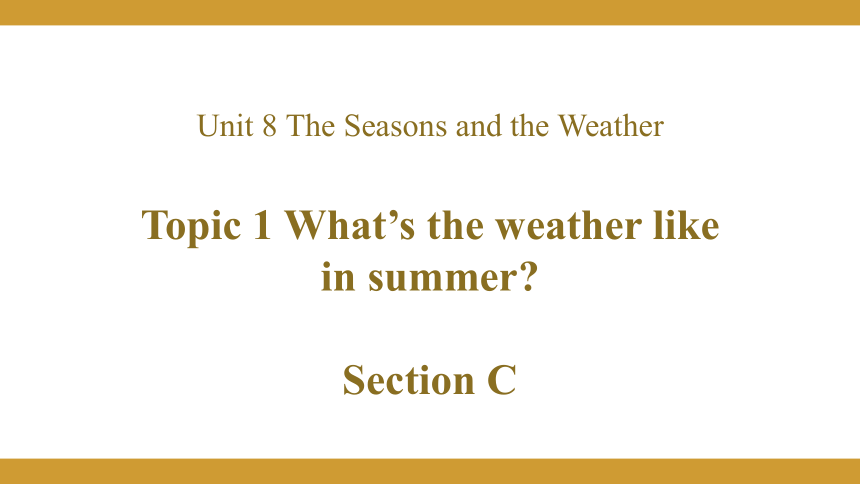 | |
| 格式 | pptx | ||
| 文件大小 | 9.3MB | ||
| 资源类型 | 试卷 | ||
| 版本资源 | 仁爱科普版 | ||
| 科目 | 英语 | ||
| 更新时间 | 2022-12-27 22:18:41 | ||
图片预览

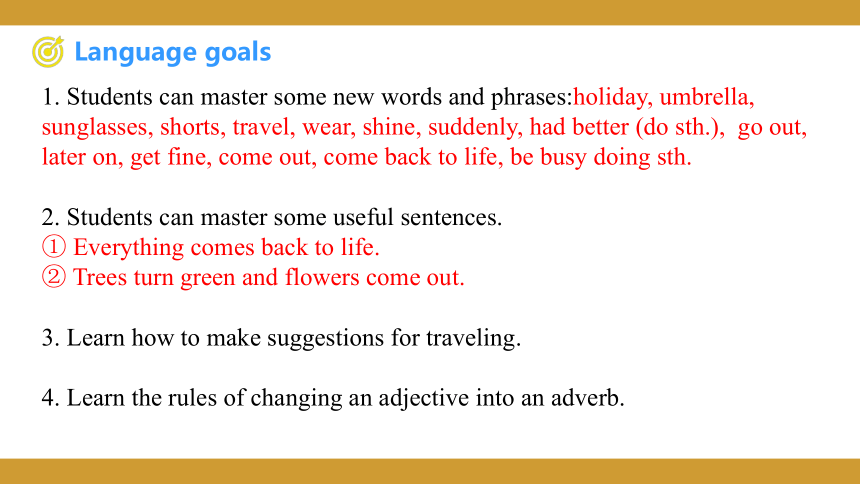
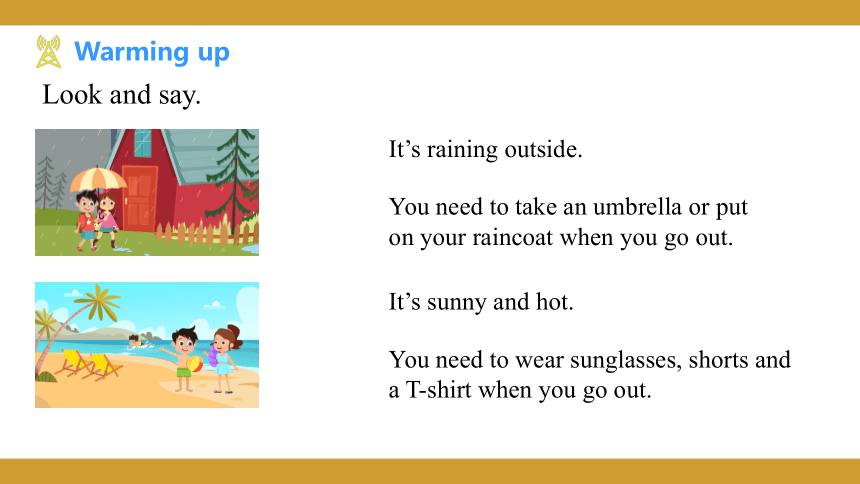
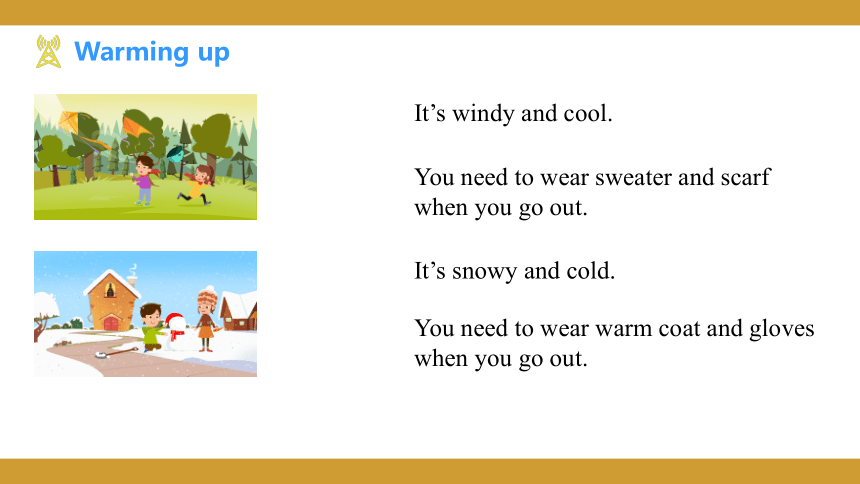
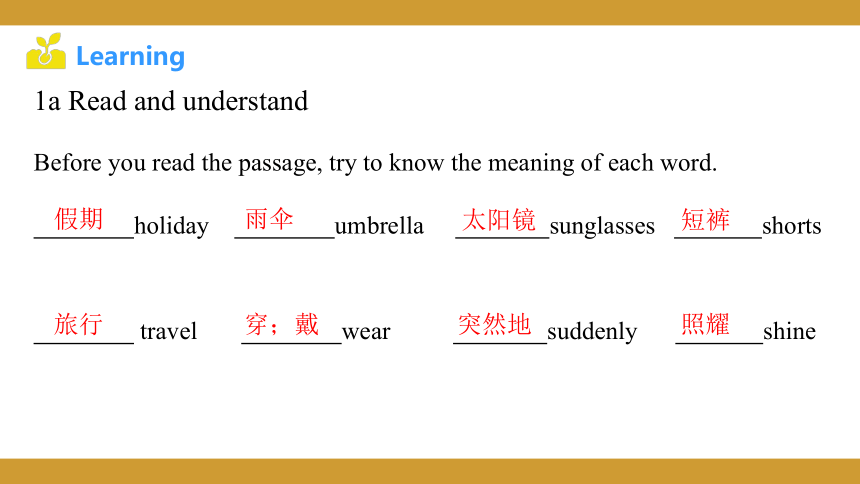
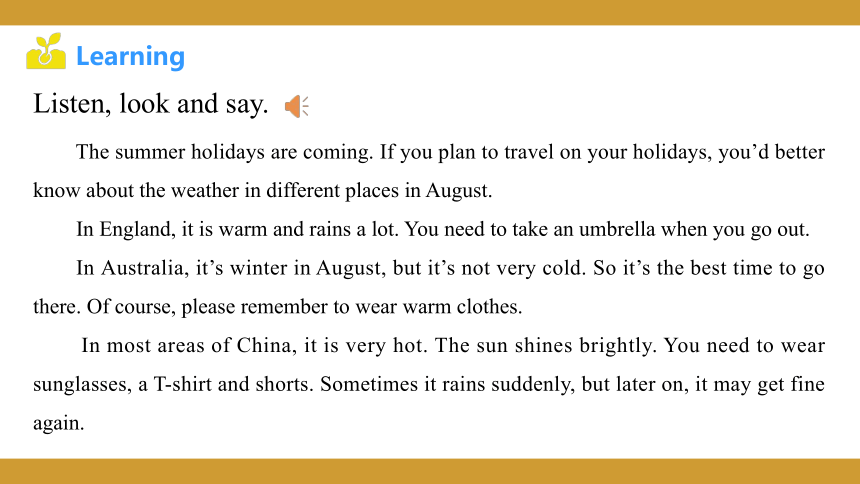
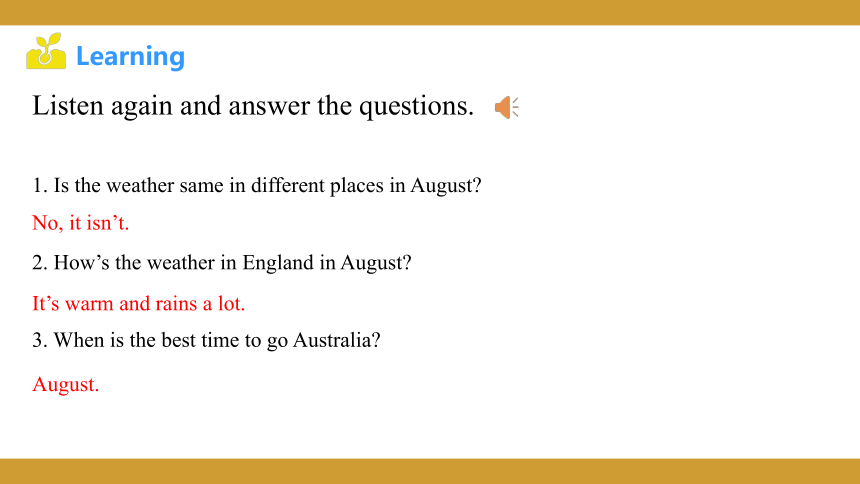
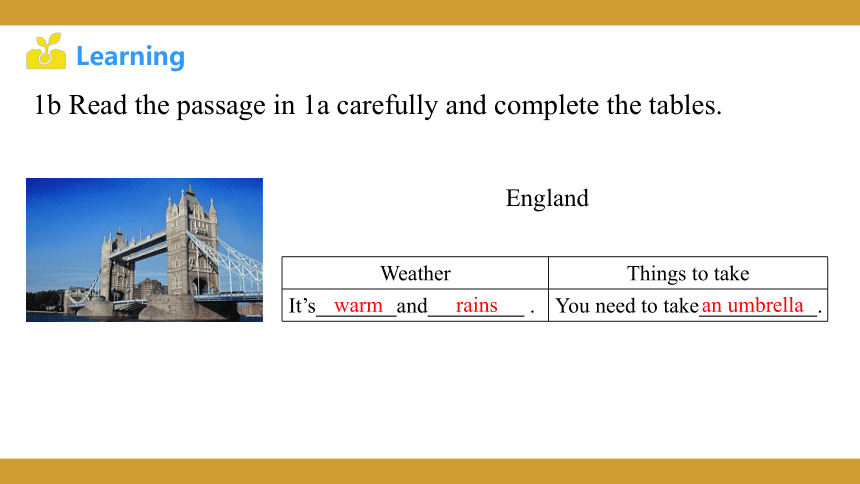
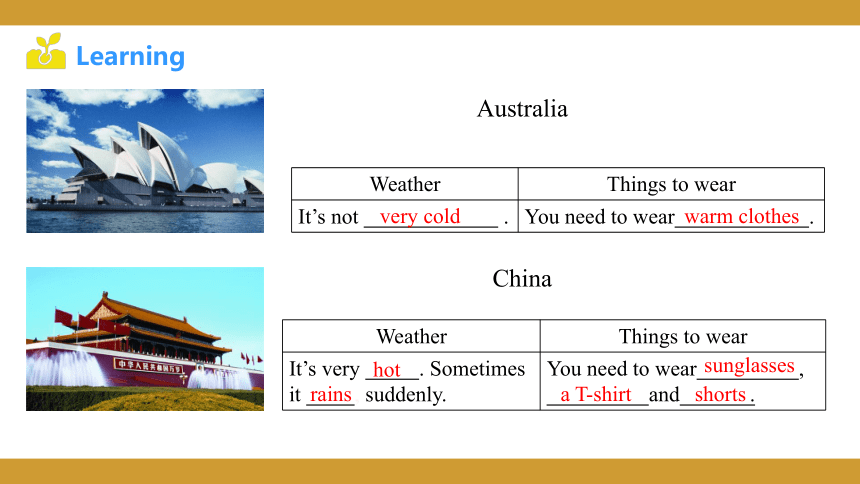
文档简介
(共28张PPT)
Topic 1 What’s the weather like in summer
Section C
Unit 8 The Seasons and the Weather
1. Students can master some new words and phrases:holiday, umbrella,
sunglasses, shorts, travel, wear, shine, suddenly, had better (do sth.), go out, later on, get fine, come out, come back to life, be busy doing sth.
2. Students can master some useful sentences.
① Everything comes back to life.
② Trees turn green and flowers come out.
3. Learn how to make suggestions for traveling.
4. Learn the rules of changing an adjective into an adverb.
Look and say.
It’s raining outside.
You need to take an umbrella or put on your raincoat when you go out.
It’s sunny and hot.
You need to wear sunglasses, shorts and a T-shirt when you go out.
It’s windy and cool.
You need to wear sweater and scarf when you go out.
It’s snowy and cold.
You need to wear warm coat and gloves when you go out.
1a Read and understand
Before you read the passage, try to know the meaning of each word.
holiday umbrella sunglasses shorts
travel wear suddenly shine
假期
雨伞
太阳镜
短裤
旅行
穿;戴
突然地
照耀
Listen, look and say.
The summer holidays are coming. If you plan to travel on your holidays, you’d better know about the weather in different places in August.
In England, it is warm and rains a lot. You need to take an umbrella when you go out.
In Australia, it’s winter in August, but it’s not very cold. So it’s the best time to go there. Of course, please remember to wear warm clothes.
In most areas of China, it is very hot. The sun shines brightly. You need to wear sunglasses, a T-shirt and shorts. Sometimes it rains suddenly, but later on, it may get fine again.
Listen again and answer the questions.
1. Is the weather same in different places in August
2. How’s the weather in England in August
3. When is the best time to go Australia
No, it isn’t.
It’s warm and rains a lot.
August.
1b Read the passage in 1a carefully and complete the tables.
England
Weather Things to take
It’s and . You need to take .
warm
rains
an umbrella
Australia
Weather Things to wear
It’s not . You need to wear .
very cold
warm clothes
China
Weather Things to wear
It’s very . Sometimes it , suddenly. You need to wear ,
and .
hot
rains
sunglasses
a T-shirt
shorts
1. The summer holidays are coming. 暑假就要到了。
此句是用现在进行时表将来。一些位移动词如(go/come/fly/leave/start)等,可以用现在进行时即be+V-ing表将来。
下周我将去上海。
I’m going to Beijing next week.
2. If you plan to travel on your holidays, you’d better know about the weather in different places in August.
(1) plan to do sth. 计划做某事
我计划明天完成工作。
I plan ________ (finish) my work tomorrow.
to finish
(2) sb. had better (not) do sth. 某人最好(不)做某事
主语常用第二人称,表示建议。
你最好带一把伞。
You’d better take an umbrella with you.
我们最好不坐公交车去那里。
We’d better not take a bus there.
3. You need to take an umbrella when you go out.
(1)需要/应该做某事 need to do sth.
(2)不需要/应该做某事 don’t/ doesn’t need to do sth. = needn’t do
(3)需要某人/某物 need sb./sth.
eg. 1. 你需要努力学习。You need to study hard.
2. 你不必着急。You don’t need to be hurry./You needn’t be hurry.
4. So it’s the best time to go there.
It’s the best time to do sth. ·······是做某事的最好时间。
早上是读英语的最好时机。
It’s the best time ____________ in the morning.
to read English
5. when 当·······的时候
(1)当我爸爸进屋的时候,我正在做作业。
When my father comes home, I’m doing my homework.
(2)当你见到他的时候,代我问他好。
When you see him, please say hello to him.
(3)当我们年轻的时候,我们有很多的梦想。
We have many dreams when we are young.
(4)图书馆开放到几点呢?
(5)入乡随俗。
When is the library open
When in Rome, do as Romans do.
6.形容词变副词的规则
①一般情况下直接加-ly,如:quick—quickly
②以y结尾的先将y改成i,再加-ly,如:happy—happily
③少数以e结尾的形容词,要去掉e再加-ly,如:true—truly
但绝大多数以e结尾的形容词仍然直接加-ly,如:polite—politely
7. Sometimes, it rains suddenly, but later on, it may get fine again.
get + 形容词 变得······
天气变暖了。
The weather ______warm.
gets
1c Work in pairs. Talk about the place you are going to visit and the weather there. Then ask your partner to give you some suggestions.
Example:
It is sunny/hot ... in Beijing/Shanghai ... You’d better wear sunglasses and shorts...
2a Listen, read and complete the passage.
Four Seasons in China
In China, _________ returns in March. The weather gets______. Everything comes back to life. Trees turn green and flowers come out. It is a wonderful season.
________begins in June. It is very______. It often rains and sometimes it rains heavily.
______comes after summer. It is the harvest season, and the farmers are busy harvesting. It’s_____and the leaves fall from the trees. The cold weather is coming.
______lasts from December to February. It’s a very_____season. We all wear warm clothes.
spring
warm
Summer
hot
Fall
cool
Winter
cold
2b Look at the picture and write down what you think of the four seasons.
Spring
return in March,
get warm,
come back to life,
a wonderful season,
fly kites …
Summer
begin in June,
very hot,
often rain,
sometimes rain heavily,
go swimming,
eat ice cream…
Fall
come after summer,
the harvest season,
farmers are busying harvesting,
cool,
leaves fall from the trees,
the cold weather is coming…
Winter
last from December to February,
a very cold season,
wear warm clothes,
the wind blows strongly,
sometimes there is ice and snow,
play with the snow,
make snowmen…
3a Listen and read the words aloud, paying attention to the word
stress.
'February De'cember Ju'ly 'sometimes 'harvest
'everything Au'stralia 'sunglasses 'Canada um'brella
3b Listen to the pronunciation of the past form of each verb. Then read them aloud.
Words: holiday, umbrella, shorts, travel, wear, shine, better, Australia,
most, sun, busy, wind, leaf, ice.
Phrases: had better (do sth.), go out, later on, get fine, come out,
come back to life, be busy doing sth.
Sentences: Everything comes back to life.
Trees turn green and flowers come out.
根据句意及首字母提示,完成下列句子。
1. —What’s your plan for the summer h________
—I plan to visit my grandparents in Beijing.
2. It’s cold today. I need to w________ warm clothes.
3. —What’s the weather like today
—It’s fine. The sun is s________ brightly.
4. There is a big tree with large l________ in my garden. Every morning I can hear(听到) the birds singing in the tree.
5. When it’s summer in China, it’s winter in A________.
olidays
ear
hining
eaves
ustralia
1.Read 1a and try to recite it.
2.Review the words, phrases and sentences.
3.Make conversations about four seasons.
Topic 1 What’s the weather like in summer
Section C
Unit 8 The Seasons and the Weather
1. Students can master some new words and phrases:holiday, umbrella,
sunglasses, shorts, travel, wear, shine, suddenly, had better (do sth.), go out, later on, get fine, come out, come back to life, be busy doing sth.
2. Students can master some useful sentences.
① Everything comes back to life.
② Trees turn green and flowers come out.
3. Learn how to make suggestions for traveling.
4. Learn the rules of changing an adjective into an adverb.
Look and say.
It’s raining outside.
You need to take an umbrella or put on your raincoat when you go out.
It’s sunny and hot.
You need to wear sunglasses, shorts and a T-shirt when you go out.
It’s windy and cool.
You need to wear sweater and scarf when you go out.
It’s snowy and cold.
You need to wear warm coat and gloves when you go out.
1a Read and understand
Before you read the passage, try to know the meaning of each word.
holiday umbrella sunglasses shorts
travel wear suddenly shine
假期
雨伞
太阳镜
短裤
旅行
穿;戴
突然地
照耀
Listen, look and say.
The summer holidays are coming. If you plan to travel on your holidays, you’d better know about the weather in different places in August.
In England, it is warm and rains a lot. You need to take an umbrella when you go out.
In Australia, it’s winter in August, but it’s not very cold. So it’s the best time to go there. Of course, please remember to wear warm clothes.
In most areas of China, it is very hot. The sun shines brightly. You need to wear sunglasses, a T-shirt and shorts. Sometimes it rains suddenly, but later on, it may get fine again.
Listen again and answer the questions.
1. Is the weather same in different places in August
2. How’s the weather in England in August
3. When is the best time to go Australia
No, it isn’t.
It’s warm and rains a lot.
August.
1b Read the passage in 1a carefully and complete the tables.
England
Weather Things to take
It’s and . You need to take .
warm
rains
an umbrella
Australia
Weather Things to wear
It’s not . You need to wear .
very cold
warm clothes
China
Weather Things to wear
It’s very . Sometimes it , suddenly. You need to wear ,
and .
hot
rains
sunglasses
a T-shirt
shorts
1. The summer holidays are coming. 暑假就要到了。
此句是用现在进行时表将来。一些位移动词如(go/come/fly/leave/start)等,可以用现在进行时即be+V-ing表将来。
下周我将去上海。
I’m going to Beijing next week.
2. If you plan to travel on your holidays, you’d better know about the weather in different places in August.
(1) plan to do sth. 计划做某事
我计划明天完成工作。
I plan ________ (finish) my work tomorrow.
to finish
(2) sb. had better (not) do sth. 某人最好(不)做某事
主语常用第二人称,表示建议。
你最好带一把伞。
You’d better take an umbrella with you.
我们最好不坐公交车去那里。
We’d better not take a bus there.
3. You need to take an umbrella when you go out.
(1)需要/应该做某事 need to do sth.
(2)不需要/应该做某事 don’t/ doesn’t need to do sth. = needn’t do
(3)需要某人/某物 need sb./sth.
eg. 1. 你需要努力学习。You need to study hard.
2. 你不必着急。You don’t need to be hurry./You needn’t be hurry.
4. So it’s the best time to go there.
It’s the best time to do sth. ·······是做某事的最好时间。
早上是读英语的最好时机。
It’s the best time ____________ in the morning.
to read English
5. when 当·······的时候
(1)当我爸爸进屋的时候,我正在做作业。
When my father comes home, I’m doing my homework.
(2)当你见到他的时候,代我问他好。
When you see him, please say hello to him.
(3)当我们年轻的时候,我们有很多的梦想。
We have many dreams when we are young.
(4)图书馆开放到几点呢?
(5)入乡随俗。
When is the library open
When in Rome, do as Romans do.
6.形容词变副词的规则
①一般情况下直接加-ly,如:quick—quickly
②以y结尾的先将y改成i,再加-ly,如:happy—happily
③少数以e结尾的形容词,要去掉e再加-ly,如:true—truly
但绝大多数以e结尾的形容词仍然直接加-ly,如:polite—politely
7. Sometimes, it rains suddenly, but later on, it may get fine again.
get + 形容词 变得······
天气变暖了。
The weather ______warm.
gets
1c Work in pairs. Talk about the place you are going to visit and the weather there. Then ask your partner to give you some suggestions.
Example:
It is sunny/hot ... in Beijing/Shanghai ... You’d better wear sunglasses and shorts...
2a Listen, read and complete the passage.
Four Seasons in China
In China, _________ returns in March. The weather gets______. Everything comes back to life. Trees turn green and flowers come out. It is a wonderful season.
________begins in June. It is very______. It often rains and sometimes it rains heavily.
______comes after summer. It is the harvest season, and the farmers are busy harvesting. It’s_____and the leaves fall from the trees. The cold weather is coming.
______lasts from December to February. It’s a very_____season. We all wear warm clothes.
spring
warm
Summer
hot
Fall
cool
Winter
cold
2b Look at the picture and write down what you think of the four seasons.
Spring
return in March,
get warm,
come back to life,
a wonderful season,
fly kites …
Summer
begin in June,
very hot,
often rain,
sometimes rain heavily,
go swimming,
eat ice cream…
Fall
come after summer,
the harvest season,
farmers are busying harvesting,
cool,
leaves fall from the trees,
the cold weather is coming…
Winter
last from December to February,
a very cold season,
wear warm clothes,
the wind blows strongly,
sometimes there is ice and snow,
play with the snow,
make snowmen…
3a Listen and read the words aloud, paying attention to the word
stress.
'February De'cember Ju'ly 'sometimes 'harvest
'everything Au'stralia 'sunglasses 'Canada um'brella
3b Listen to the pronunciation of the past form of each verb. Then read them aloud.
Words: holiday, umbrella, shorts, travel, wear, shine, better, Australia,
most, sun, busy, wind, leaf, ice.
Phrases: had better (do sth.), go out, later on, get fine, come out,
come back to life, be busy doing sth.
Sentences: Everything comes back to life.
Trees turn green and flowers come out.
根据句意及首字母提示,完成下列句子。
1. —What’s your plan for the summer h________
—I plan to visit my grandparents in Beijing.
2. It’s cold today. I need to w________ warm clothes.
3. —What’s the weather like today
—It’s fine. The sun is s________ brightly.
4. There is a big tree with large l________ in my garden. Every morning I can hear(听到) the birds singing in the tree.
5. When it’s summer in China, it’s winter in A________.
olidays
ear
hining
eaves
ustralia
1.Read 1a and try to recite it.
2.Review the words, phrases and sentences.
3.Make conversations about four seasons.
同课章节目录
- Unit 5 Our school life
- Topic 1 I usually come to school by subway.
- Topic 2 A few students are running around the play
- Topic 3 My school life is very interesting.
- Unit 6 Our local area
- Topic 1 Is there a computer in your study?
- Topic 2 My home is in an apartment building.
- Topic 3 Which is the way to the hospital?
- Review of Units 5-6
- Unit 7 The Birthday
- Topic 1 When is your birthday?
- Topic 2 Can you sing an English song?
- Topic 3 Everyone had a good time.
- Unit 8 The seasons and the Weathe
- Topic 1 What's the weather like in summer?
- Topic 2 The summer holidays are coming.
- Topic 3 Let’s celebrate!
- Review of Units 7-8
- 旧版资料
- Unit 5 Our School Life
- Unit 6 Our Local Area
- Unit 7 The Birthday
- Unit 8 The seasons and the Weathe
- Unit 7 Celebrating the Birthday(老版本)
